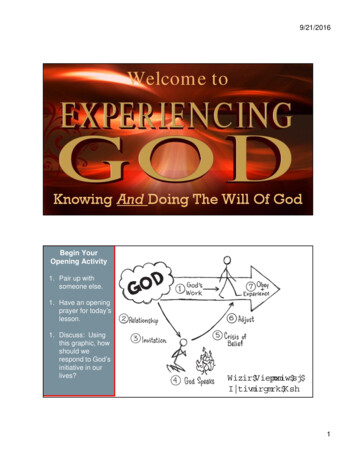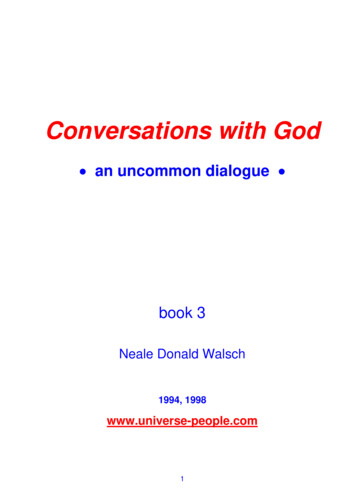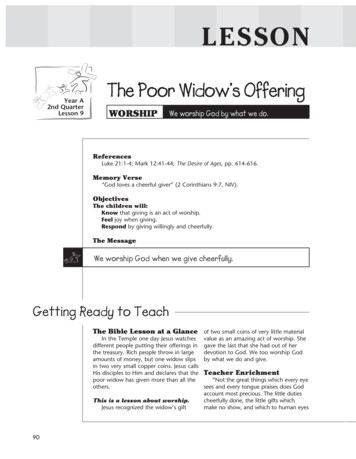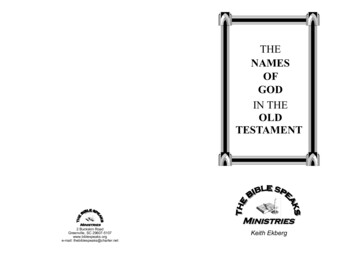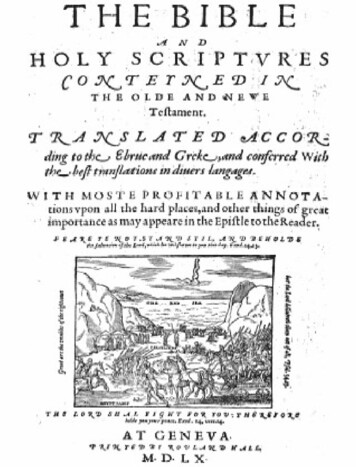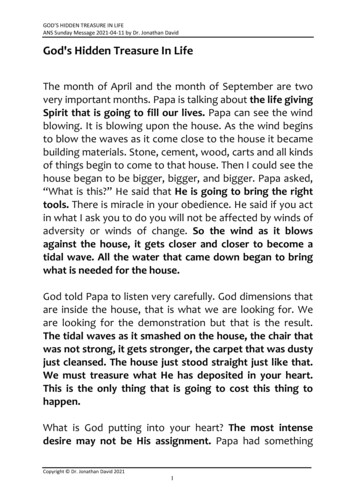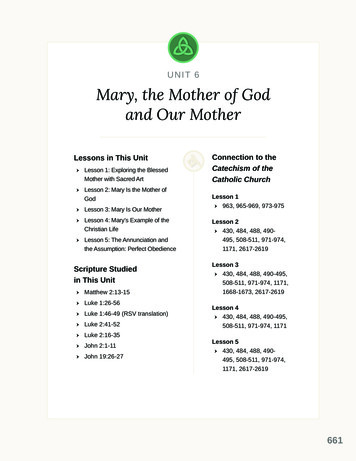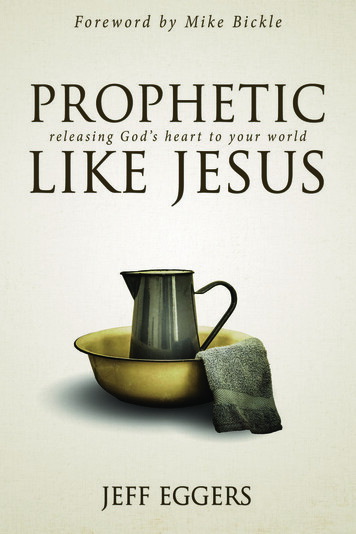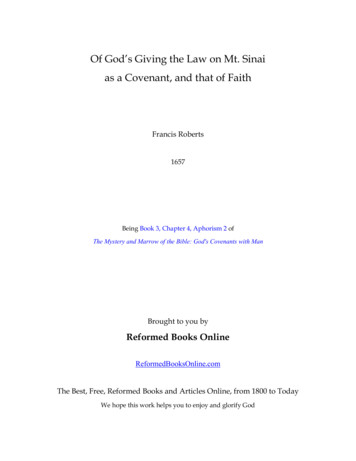
Transcription
Works of Jurgen MoltmannJURGEN MOLTMANNAvailable from Fortress PressThe Crucified GodTheology of HopeThe Church in the Power of the SpiritThe Trinity and the KingdomTHE CROSS OF CHRIST AS THE FOUNDATIONAND CRITICISM OF CHRISTIAN THEOLOGYGod in CreationThe Way of Jesus ChristThe Spirit of LifeFortress Press Minneapolis
THE CRUCIFIED GODThe Cross of Christ as the Foundationand Criticism of Christian TheologyFirst Fortress Press edition, 1993Translated by R. A. Wilson and John Bowden from the German Der gekreuzigteGott (Christian Kaiser Verlag, Munich, second edition 1973). Preface to thepaperback edition translated by Margaret Kohl.Copyright 1974 in the English translation by SCM Press Ltd. New PrefaceCopyright 1991 HarperCollins Publishers. All rights reserved. Except for briefquotations in critical articles or reviews, no part of this book may be reproducedin any manner without prior written permission from the publisher. Write to:Permissions, Augsburg Fortress Publishers, 426 S. Fifth St., Box 1209,Minneapolis, MN 55440.Author photo: Thomas Kucharz.Library of Congress Cataloging-in-Publication DataMoltmann, Jiirgen.[Gekreuzigte Gott. English]The crucified God : the cross of Christ as the foundation and criticism ofChristian theology /Jiirgen Moltmann : [translated by R.A. Wilson and JohnBowden from the German] — 1st Fortress Press ed.p.cm.Translation of: Der gekreuzigte Gott.Reprint. Originally published: New York : Harper & Row, 1974.Includes bibliographical references and index.ISBN 0-8006-2822-5 (alk. paper)1. Jesus Christ—Person and offices. 2. Jesus Christ—Crucifixion. I. Title.BT202.M55131993232—dc20CIPThe paper used in this publication meets the minimum requirements of AmericanNational Standard for Information Sciences—Permanence of Paper for PrintedLibrary Materials, ANSI Z329.48-1984.(op) Manufactured in the U.S.A.97AF 1-282234567891 0IllustrissimaeDukianae universitatiin civitate Carolina septentnonaliob summum in Sancta Theologiahonorem sibi oblatumhunc libntmgrata devotoque ammodedicatJiirgen Moltmanna.d. III. Id. Mai.anno p. Chr.n. MCLXXIH.
CONTENTSPreface to the Paperback EditionIn Explanation of the ThemeiixiT h e Identity and Relevance of Faith1. The Crisis of Relevance in Christian Life2. The Crisis of Identity for Christian Faith3. Revelation in Contradiction and Dialectical Knowledge7818252 T h e Resistance of the Cross against its Interpretations1. The Unreligious Cross in the Church2. The Cult of the Cross3. The Mysticism of the Cross4. Following the Cross5. The Theology of the Cross3232414553653 Questions about Jesus1. Is Jesus true God?2. Is Jesus true Man?3. 'Are you he who is to come?'4. 'Who do you say that I am?'828792981034 The Historical Trial of Jesus1. The Question of the Origin of Christology2. Jesus' Way to the Cross(a) Jesus and the law: 'The blasphemer'(b) Jesus and authority. 'The rebel'(c) Jesus and God: 'The godforsaken'1121141261281361455 The Eschatological Trial of Jesus Christ1. Eschatology and History2. Jesus' Resurrection from the Dead3. The Significance of the Cross of the Risen Christ4. The Future of God in the Sign of the Crucified Christ160160166178187
6The 'Crucified God'2001. The 'Death of God' as the Origin of Christian Theology? 2002. Theism and the Theology of the Cross2073. The Theology of the Cross and Atheism2194. The Doctrine of Two Natures and the Suffering of Christ 2275. Trinitarian Theology of the Cross2356. Beyond Theism and Atheism2497. Beyond Obedience and Rebellion2528. Trinity and Eschatology2569. The Experience of Human Life in the Pathos of God267(a) The apatheia of God and the freedom of man267(b) The pathos of God and the sympatheia of man270(c) The fullness of life in the trinitarian history of God27478Ways towards the Psychological Liberation of Man1. Psychological Hermeneutics of Liberation2. Patterns of the Dialogue between Theology andPsychoanalysis3. The Law of Repression4. The Law of Parricide5. The Principle of Illusion298303308Ways towards the Political Liberation of Man1. Political Hermeneutics of Liberation2. Political Religion3. Political Theology of the Cross4. Vicious Circles of Death5. Ways towards Liberation3173173213253293326. The Transformations of God in the Liberations of Men335AIndex of Namesbbreviations291291294341342PREFACE TO THEPAPERBACK EDITIONT h e theological foundation for Christian hope is the raising ofthe crucified Christ. Anyone who develops a 'theology of hope'from this centre will be inescapably reminded of the other sideof that foundation: the cross of the risen Christ. So after publishing Theology of Hope, the logic of my theological approachled me to work more deeply on the remembrance of the crucifiedChrist. Hope without remembrance leads to illusion, just as,conversely, remembrance without hope can result in resignation.Of course I had not planned this. I was led to the theologyof the cross through reactions to Theology of Hope and, evenmore, through personal participation in the sufferings of thoseyears. Wherever Christian hope makes people active and leadsthem into the 'creative discipleship' of Christ, the contradictionsand confutations of the world are painfully experienced. 'Whenfreedom is near the chains begin to chafe'. One begins to sufferwith the victims of injustice and violence. One puts oneself onthe side of the persecuted and becomes persecuted oneself. Inthe years between 1968 and 1972 I discovered something of thisboth personally and politically. At that time the suffering offriends living under Stalinism in Eastern Europe and undermilitary dictatorships in Latin America and South Korea movedme deeply. In 1970 I wrote,As well as developing a political theology, I have resolved to think moreintensively than I have done up to now about the meaning of the cross ofChrist for theologv, for the church and for society. In a civilization that glorifiessuccess and happiness and is blind to the sufferings of others, people's eyescan be opened to the truth if they remember that at the centre of the Christianfaith stands an unsuccessful, tormented Christ, dying in forsakenness. Therecollection that God raised this crucified Christ and made him the hope ofthe world must lead the churches to break their alliances with the powerfuland to enter into the solidarity of the humiliated.1IX
Preface to the Paperback EditionThe same thing now happened to me that had happenedwhen I was writing Theology of Hope. The whole of theologywas drawn as if by a magnifying glass into a single focus: thecross. I began to see things with the eyes of the Christ dyingon the cross. I often used to sit for long periods of time meditating before the crucifix in the Martinskirche in Tubingen. Forme the crucified Christ became more and more 'the foundationand criticism of Christian theology'. And for me that meant,whatever can stand before the face of the crucified Christ is trueChristian theology. What cannot stand there must disappear.This is especially true of what we say about God. Christ diedon the cross with a loud cry, which Mark interprets with thewords of the twenty-second psalm: 'My God, why hast thouforsaken me?' This cry of abandonment is either the end of everytheology and every religion, or it is the beginning of a trulyChristian theology—and that means a liberating theology. T h ecriticism that emanates from Christ's cross exposes us theologians for what we are, like Job's friends. We want to produce ananswer to the question about God with which Christ dies. Buthe dies with this open question. So a truly Christian theologyhas to make Jesus' experience of God on the cross the centre ofall our ideas about G o d : that is its foundation.I began with an interpretation of the theologia crucis of theyoung Luther. I saw that when God reveals himself to us godlessmen and women, who turn ourselves into proud and unhappygods, he does not do so through power and glory. He revealshimself through suffering and cross, so he repudiates in us thearrogant man or woman and accepts the sinner in us. But thenI turned the question around, and instead of asking just whatGod means for us human beings in the cross of Christ, I askedtoo what this human cross of Christ means for God. I found theanswer in the idea of God's passion, which reveals itself in thepassion of Christ. What is manifested in the cross is God'ssuffering of a passionate love for his lost creatures, a sufferingprepared for sacrifice.T h e idea of the passion of the passionate God contraverts thefundamental axiom of Aristotelian, philosophical theology, whichwas God's essential apathy. T h e impassibility of God was anidea cherished by the Greek Fathers (with the exception ofOrigen) and by the mediaeval theologians. When I began to getxPreface to the Paperback Editionbeyond this axiom, I discovered links about which I had previously had no idea. My first discovery was the Jewish conceptof the pathos of God, which Abraham Heschel found in theprophets; then my attention was drawn to rabbinic and kabbalistic ideas about God's Shekinah in the people of Israel, throughwhich God becomes the companion-in-suffering of his persecuted people. I owe these insights to Franz Rosenzweig andGershom Scholem.But it was not merely the experiences of the years between1968 and 1972 that led me to this theology of the cross. Inaddition, I experienced a very different 'dark night' in my soul,for the pictures of the Bergen-Belsen concentration camp andhorror over the crimes in Auschwitz, had weighed on me andmany other people of my generation ever since 1945. Much timepassed before we could emerge from the silence that stops themouths of people over whom the cloud of the victims hangsheavy. It was Jewish survivors of the Holocaust and Jewishtheologians who opened our lips. The Crucified God was saidto be a Christian 'theology after Auschwitz'. T h a t is true, inasmuch as I perceived Golgotha in the shadow of Auschwitz,finding help here in 'Jewish theology after Auschwitz' and especially in Elie Wiesel. Ever since then, the question about Godfor me has been identical with the cry of the victims for justiceand the hunger of the perpetrators for a way back from the pathof death.At the end of the war the theology of God's suffering hadalready been outlined by the Japanese theologian Kazoh Kitamori 2and by the theologian of the German resistance movement,Dietrich Bonhoeffer. 'Only the suffering God can help', wroteBonhoeffer from his prison cell. 3 It was only after I had writtenThe Crucified God that I discovered the intense discussion aboutthe passibility or impassibility of God that had been carried onin Anglican theology of the nineteenth and twentieth centuriesbut had been completely ignored by German theology.I found the positive influence of my theology of the crossespecially in the christology of Jon Sobrino, who deepened andsharpened it for the Latin American context. 4 1 have learnt fromhis theology of the cross, which he not only taught but suffered.A few days ago I received a letter from Robert McAfee Brown,in which he told me the following moving story from San SalXI
Preface to the New Editionvador. On 16 November 1989, six well-known Jesuits, togetherwith their housekeeper and her daughter, were brutally murdered in the university there. The rector of the university, FatherIgnacio Ellacuria, was one of them. Jon Sobrino escaped themassacre only because he happened not to be in the country atthe time. The letter continues, 'When the killers were draggingsome of the bodies back into the building, as they took one ofthe bodies into Jon's room, they hit a bookcase and knocked abook on to the floor, which became drenched with the martyr'sblood. In the morning, when they picked up the book, theyfound that it was your The Crucified God.' This sign and symbolgives me a great deal to think about. What it says to me is thatthese martyrs are the seed of the resurrection of a new world.Like Archbishop Oscar Romero, they are the hope of the people:unforgettable, inextinguishable, irresistible.The translation of The Crucified God into many languagesbrought me into the community of many struggling and suffering brothers and sisters. The book was read in Korean andSouth African prisons. People working in slums and hospitalswrote to me, as well as people who were themselves sufferingunder 'the dark night of the soul'. I came into contact withCatholic orders vowed to poverty and the mysticism of the cross,and with Mennonite congregations who are following the pathof Jesus. I need not tell it all. What I should like to say is this:even more than Theology of Hope, this book brought me into agreat company. I believe it is the company of people under thecross. Beneath the cross the boundaries of denominations andcultures collapse. T h e community of the sufferers and the seekers is an open, inviting community. It is about this communitythat I am thinking, now that this book appears again, for it isthere that I am at home.Preface to the Paperback EditionNOTES1. Umkehrzur Zukunft, Munich 1970, 14.2. Theology of the Pain of God, English translation, 1965.3. Letters and Papers from Prison, English translation, 1977, 361.4. See his Chnstology at the Crossroads. A Latin American Approach,Orbis 1978.SELECTED LITERATUREP. F. Momose, Kreuzestheologie. Eine Auseinandersetzung mil Jiirgen Moltmann. Mil einem Sachwort von Jiirgen Moltmann (Freiburg, 1978;Japanese edition in preparation).Warren McWilliams, The Passion of God. Divme Suffering in ContemporaryProtestant Theology (Macon, GA: Mercer Univ. Press, 1985).Paul S. Fiddes, The Creative Suffering of God (Oxford: Clarendon Press,1988).Rebecca S. Chopp, The Praxis of Suffering. An Interpretation of Liberationand Political Theologies (New York: Orbis Books, 1989).Jiirgen MoltmannTubingen, GermanyApril 1990XllXlll
THE CRUCIFIED GOD
IN EXPLANATION OF THE THEMEThe cross is not and cannot be loved. Yet only the crucifiedChrist can bring the freedom whic
THE CRUCIFIED GOD The Cross of Christ as the Foundation and Criticism of Christian Theology First Fortress Press edition, 1993 Translated by R. A. Wilson and

